英语诗歌讲解poetry
English poetry英国诗歌简介
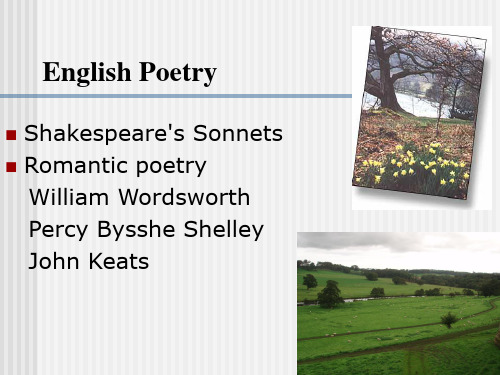
Major romantic poets
William Blake 1757-1827 Songs of Innocence
William Wordsworth 1770-1850 Lyrical Ballads, The Prelude, I wander Lonely as a Cloud
S.T. Coleridge 1772-1834 Lyrical Ballads, Kubla Khan George Gordon Byron 1788-1824 Don Juan, Childe Harold’s Pilgrimage Percy Bysshe Shelly 1792-1822 Queen Mab, Prometheus Unbound, Ode to the West Wind John Keats 1795 – 1821 Ode to a Nightingale, Ode on a Grecian Urn, Ode to Autumn
English Poetry
Shakespeare's Sonnets Romantic poetry William Wordsworth Percy Bysshe Shelley John Keats
Sonnet is a very important form of English metrical poetry. It has 14 lines written to a regular rhyme scheme. Sonnet was invented by the Italian poet, Francesco Petrarch in the early 14th century. Sonnet makes it easier to express deep thought and emotion. In English poetry, there are three types of sonnet: the Italian, the Shakespearean and the Spenserian. These three types of sonnet all consist of 14 lines, but the rhyme schemes are different.
英语作文介绍英文诗歌
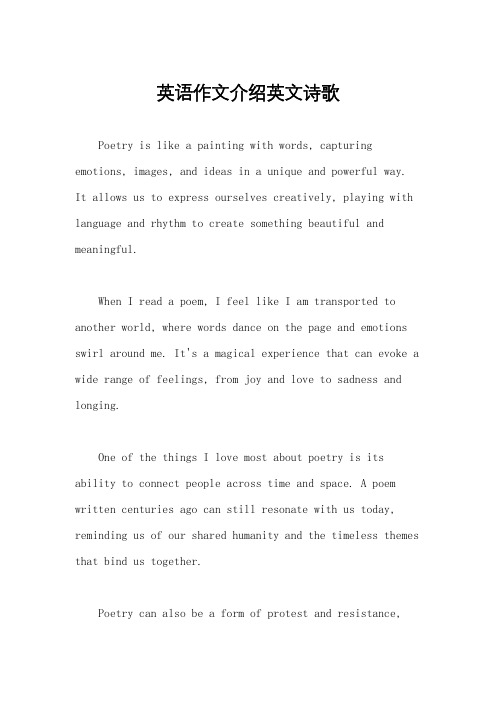
英语作文介绍英文诗歌Poetry is like a painting with words, capturing emotions, images, and ideas in a unique and powerful way. It allows us to express ourselves creatively, playing with language and rhythm to create something beautiful and meaningful.When I read a poem, I feel like I am transported to another world, where words dance on the page and emotions swirl around me. It's a magical experience that can evoke a wide range of feelings, from joy and love to sadness and longing.One of the things I love most about poetry is itsability to connect people across time and space. A poem written centuries ago can still resonate with us today, reminding us of our shared humanity and the timeless themes that bind us together.Poetry can also be a form of protest and resistance,giving voice to the marginalized and oppressed. It has the power to challenge authority, spark revolutions, andinspire change. In this way, poetry is not just a form of art, but also a tool for social justice and transformation.Whether it's a sonnet by Shakespeare, a haiku by Basho, or a spoken word poem by a modern artist, poetry has the ability to touch our hearts and minds in a way that few other forms of expression can. It is a gift that enriches our lives and reminds us of the beauty and power of language.。
英语诗歌介绍(Introudction-to-English-Poetry)

b
2) abab(交叉韵):
How do you like to go up in a swing. a
Up in the air so blue?
b
Oh, I do think it the pleasantest thing a
Ever a child can do!
b
3) abba(首尾韵):
d) Monosyllabic Rhyme(单音节韵):
I / fly ; fool / rule ; write / fight ; again / remain /sustain
e) Bi-syllabic Rhyme (双音节韵) :
borrow / sorrow ; daughter /water ; conversation /compensation Roman / no man ; know it / show it
11. Sonnet:
1) Italian Sonnet(意大利体十四行诗) 2) Spenserian Sonnet(斯宾塞体十四行诗) 3) Shakespearian Sonnet(莎士比亚体十四行诗)
1) Italian Sonnet Francesco Petrach an octave + a sestet
c
And seems to one in drowsiness half lost,
d
The Grasshopper’s among some grassy hills. e
2) Spenserian Sonnet Edmund Spenser 3 quatrains + a couplet
Ye tradefull merchants, that with weary toyle
英语诗歌鉴赏及名词解释英文版

The Basic Elements of Appreciating English Poetry1.What is poetry"➢Poetry is the expression of Impassioned feeling in language.➢“Poetry is the spontaneous overflow of powerful feelings: it takes its origin from emotion recollected in tranquility.〞➢“Poetry, in a general sense, may be defined to be the expression of the imagination.〞➢Poetry is the rhythmical creation of beauty.➢Poetry is the image of man and nature.➢“诗言志,歌咏言。
〞---"虞书"➢“诗言志之所以也。
在心为志,发言为诗。
情动于中而行于言,言之缺乏,那么嗟叹之;嗟叹之缺乏,故咏歌之;咏歌之缺乏,不知手之舞之,足之蹈之也。
情发于声;声成文,谓之音。
〞---"诗·大序"➢“诗是由诗人对外界所引起的感觉,注入了思想与情感,而凝结了形象,终于被表现出来的一种‘完成’的艺术。
〞---艾青:"诗论"2.The Sound System of English Poetrya. The prosodic features➢Prosody (韵律)---the study of the rhythm, pause, tempo, stress and pitch features of a language.➢Chinese poetry is syllable-timed, English poetry is stress-timed.➢Stress: The prosody of English poetry is realized by stress. One stressed syllable always comes together with one or more unstressed syllables.eg. Tiger, /tiger, /burning /brightIn the /forest /of the/ night,What im/mortal /hand or /eyeCould frame thy/ fearful /symme/try" ---W. BlakeLength: it can produce some rhetorical and artistic effect.eg. The curfew tolls the knell of parting day,The lowing herd wind slowly o’er the lea,The Ploughman homeward plods his weary way,And leaves the world to darkness and to me.---Thomas GrayLong vowels and diphthongs make the poem slow, emotional and solemn; short vowels quick, passionate, tense and exciting.Pause: it serves for the rhythm and musicality of poetry.b. Meter or measure (格律)poem---stanza/strophe---line/verse---foot---arsis + thesis;Meter or measure refers to the formation way of stressed andunstressed syllables.Four common meters:a) Iambus; the iambic foot (抑扬格)eg. She walks/ in beau/ty, like/ the nightOf cloud /less climes/ and star/ry skies;And all/ that’s best /of dark/ and brightMeet in /her as /pect and /her eyes. ---Byronb) Trochee; the trochaic foot〔扬抑格〕eg. Never /seek to/ tell thy/ love,Love that/ never/ told can/ be. ---Blakec) Dactyl; the dactylic foot 〔扬抑抑格〕eg. Cannon to/ right of them,Cannon to/ left of them.Cannon in/ front of them,Volley’d and/ thunder’d. ---Tennysond) Anapaest; the anapestic foot〔抑抑扬格〕eg. Break,/ break, /break,On thy cold /grey stones,/ O sea!And I would /that my tongue/ could utterThe thought/ that arise /in me. ---Tennysonc) Other metersAmphibrach, the amphibrachic foot (抑扬抑格);Spondee, the spondaic foot(扬扬格);Pyrrhic, the pyrrhic foot (抑抑格);d) Actalectic foot (完整音步) and Cactalectic foot〔不完整音步〕eg. Rich the / treasure,Sweet the / pleasure. (actalectic foot)Tiger,/ tiger, /burning /bright,In the/ forest/ of the/ night. (cactalectic foot )e) Types of footmonometer(一音步)dimeter〔二音步〕trimeter〔三音步〕tetrameter〔四音步〕pentameter〔五音步〕hexameter〔六音步〕heptameter〔七音步〕octameter〔八音步〕We have iambic monometer, trochaic tetrameter, iambicpentameter, anapaestic trimeter, etc., when the number offoot and meter are taken together in a poem.C. RhymeWhen two or more words or phrases contain an identicalor similar vowel sound, usually stressed, and theconsonant sounds that follow the vowel sound areidentical and preceded by different consonants, a rhymeoccurs.➢It can roughly be divided into two types:internal rhyme and end rhymeInternal rhymea) alliteration: the repetition of initial identical consonant sounds or any vowel sounds in successive or closely associated syllables, esp. stressed syllables.eg. The fair breeze blew, the white foam flew,The furrow followed free.---ColeridgeI slip, I slide, I gloom, I glance,Among my skinning swallows.---Tennyson Whereat with blade, with bloody blameful blade,He bravely broached his boiling bloody breast.---Shakespeare “Consonant cluster〞(辅音连缀)“internal or hidden alliteration〞(暗头韵) as in“Here in the long unlovely street〞(Tennyson)The Scian & the Teian muse,The hero’s harp, the love’s lute,Have found the fame your shores refuse.---Byronb) Assonance (腹韵/元音叠韵/半谐音):the repetition of similar or identical vowel sounds in a line ending with different consonant sounds.eg. Do not go gentle into that nightOld age should burn and rave at close of day.Rage, rage against the dying of the light.Though wise men at their end know dark is right,Because their words have forked no lightning theyDo not go gentle into that night.c) Consonance (假韵): the repetition of the ending consonant sounds with different preceding vowels of two or more words in a line.eg. At once a voice arose amongThe bleak twigs overheadIn a full-hearted evensongOf joy illimited.---HardyEnd rhyme: lines in a poem end in similar or identicalstressed syllables.a) Perfect rhymePerfect rhyme (in two or more words) occurs in the following three conditions:identical stressed vowel sounds (lie--high, stay--play);the same consonants after the identical stressed vowels (park--lark, fate-- late);different consonants preceding the stressed vowels (first– burst);follow—swallow (perfect rhyme)b) imperfect/ half rhyme: the stressed vowels in two or more words are the same, but the consonant sounds after and preceding are different.eg. fern—bird, faze—late, like—rightc) Masculine and feminine rhymeeg. Sometimes when I’m lonely,Don’t know why,Keep thinking I won’t be lonelyBy and by.---HughesThe comrade of thy wanderings over Heaven,As then, when to outstrip thy skiey speedScarce seem’d a vision; I would ne’er have striven…---Shelley Rhyme scheme (韵式)a) Running rhyme scheme (连续韵)two neighbouring lines rhymed in aa bb cc dd:eg. Tiger, tiger, burning brightIn the forests of the night,What immortal hand or eyeCould frame thy fearful symmetry"In what distant deeps or skiesBurnt the fire of thine eyes"On what wings dare he aspire"What the hand dare seize the fire"b) Alternating rhyme scheme (穿插韵)rhymed every other line in a b a b c d c d:eg. Shall I compare thee to a summer’s day"Thou art more lovely and more temperate:Rough winds do shake the darling buds of May,And summer’s lease hath all too short a date:---Shakespearec) enclosing rhyme scheme (首尾韵)In a quatrain, the first and the last rhymed, and the second and the third rhymed in a b b a:eg. When you are old and gray and full of sleep,And nodding by the fire, take down this book,And slowly read, and dream of the soft lookYour eyes had once, and of their shadows deep;---W. B. YeatsD. Form of poetry ( stanzaic form)a) couplet: a stanza of two lines with similar end rhymes:eg. A little learning is a dangerous thing;Drink deep, or taste not the Pierian Spring.b) heroic couplet: a rhyming couplet of iambic pentameter:eg. O could I flow like thee, and make thy streamMy great example, as it is my theme:---DenhamThen share thy pain, allow that sad relief;Ah, more than share it, give me all thy grief.---Popec) Triplet / tercet: a unit or group of three lines, usu. rhymedeg. He clasps the crags with crooked hands;Close to the sun in lonely lands,Ringed with the azure world, he stands.The wrinkled sea beneath him crawls:He watches from his mountains walls,And like a thunderbolt he falls.---Tennysond) quatrain: a stanza of four lines rhymed or unrhymed.eg. O my luve is like a red, red rose,That’s newly sprung in June;O my luve is like the melodieThat’s sweetly play’d in tune.As fair art thou, my bonie lass,So deep in luve am I;And I will luve thee still, my dear,Till a’ the seas gang dry.---Burnse) Sonnet: a fixed verse form of Italian origin consisting of14 lines that are characteristically in iambic pentameter:The Petrarchan / Italian sonnet (Francesco Petrarch):two parts: octave, asking question, presenting a problem,or expressing an emotional tension rhyming abba abba;while the sestet, solving the problem rhyming cde cde,cde cde, or cd cd cd.Shakespearean / English sonnet:arranged usually into three quatrains and a couplet,rhyming abab cdcd efef gg. The first quatrain introduces a subject, the second expands, and once more in the third, and concludes in the couplet.Spenserian sonnet: three quatrains and a couplet rhyming abab bcbc cdcd ee;Miltonic sonnet: simply an ltalian sonnet that eliminates the pause between the octave and sestet.f) Blank verse: the unrhymed iambic pentametereg. To be, or not to be: that is the question:Whether ’tis nobler in the mind to sufferThe slings and arrows of outrageous fortune,Or to take arms against a sea of troubles,And by opposing end them" To die: to sleep;---Shakespeareg) Free verse: poetry that is based on irregular rhythmiccadence of the recurrence, with variations, of phrases,images and syntactical patterns rather than theconventional use of meter.eg. DaysWhat are days for"Days are where we live.They come, they wake usTime and time over.They are to be happy inWhere can we live but days"Ah, solving that questionBring the priest and doctorIn their long coatsRunning over the fields.---Philip Larkin3.The semantic system of English poetrya. The meaning of poetryPoetry is “the one permissible way of saying one thingand meaning another〞. (Frost)The meaning of a poem usually consists of three levels,that is, the literal (the lowest), the sensory (the medium)and the emotional (the highest).b. Image---the soul of the meaning in poetrya) Definition: “language that evokes a physical sensationproduced by one or more of the five senses--- sight,hearing, taste, touch and smell.〞(Kirszner and Mandell)A literal and concrete representation of a sensoryexperience or of an object that can be known by one ormore of the senses.b) Types of imagesIn terms of senses:visual image (视觉意象)auditory image〔听觉意象〕olfactory image〔嗅觉意象〕tactile image 〔触觉意象〕gustatory image 〔味觉意象〕kinaesthetic image 〔动觉意象〕eg. Spring, the sweet spring, is the year’s pleasant king,Then blooms each thing, then maids dance in a ring,Cold doth not sting, the pretty birds do sing:Cuckoo, jug-jug, pu-we, to-witta-woo!---Thomas NasheIn terms of the relation between the image and the object:Literal (字面意象) and figurative image 〔修辞意象〕The former refers to the one that involves no necessarychange or extension in the obvious meaning of the words;or the one in which the words call up a sensoryrepresentation of the literal object or sensation.The latter is the one that involves a turn on the literalmeaning of the words.eg. Let us walk in the white snowIn a soundless space;With footsteps quiet and slow,At a tranquil pace,Under veils of white lace.---Elinor WylieIn terms of the readers: fixed and free image〔稳定意象和自由意象〕By fixed or tied image, it is the one so employed that itsmeaning and associational value is the same ornearly the same for all readers.By free image, it is the one not so fixed by the context thatits possible meanings or associational values are limited, itis therefore, capable of having various meanings or valuesfor various people.eg. SnakeI saw a young snake glideOut of the mottled shadeAnd hang limp on a stone:A thin mouth, and a tongueStayed, in the still air.It turned; it drew away;Its shadow bent in half;It quickened and was gone.I felt my slow blood warm.I longed to be that thing,The pure, sensuous form.And I may be, some time. ---Theodore Roethkec) The function of image:➢to stimulate readers’ senses;➢to activate readers’ sensory and emotional experience;➢to involve the readers in the creation of poetry with personal and emotional experience; ➢to strike a responsive chord in the hearts of readers;eg. FogThe fog comeson little cat feet.It sits lookingover harbor and cityon silent haunchesand then moves on.---Carl Sandbergeg. Fire and iceSome say the world will end in fire,Some say in ice.From what I’ve tasted of desireI hold with those who favor fire.But if it had to perish twice,I think I know enough of hateTo say that for destruction iceIs also greatAnd would suffice. ---R. FrostC. The means of expressing meaninga) Phonetic devicesonomatopoeiaA widow birdeg. A widow bird was mourning for her loveUpon a wintry bough;The frozen wind crept on above,The freezing stream belowThere was no leaf upon the forest bare,No flower upon the ground,And little motion in the airExcept the mill-wheel’s sound. P. B. ShelleyPuneg.The little black thing among the snowCrying “’weep, ’weep〞in notes of woe!b) figures of speechA. comparison: metaphor; simile (tenor 本体, vehicle 喻体)B. conceitC. personificationD. metonymy (换喻)E. apostropheF. synaesthesia 〔“通感〞或“联觉〞〕G. symbolismH. hyperboleI. Allusion 〔典故〕c) Deviation (变异):the digression from the normal way ofexpressionsLexical deviation (self-made words)Grammatical deviation (slang, vernacular)Deviation of registersDeviation of cultural subjects。
英语诗歌简介English Poetry
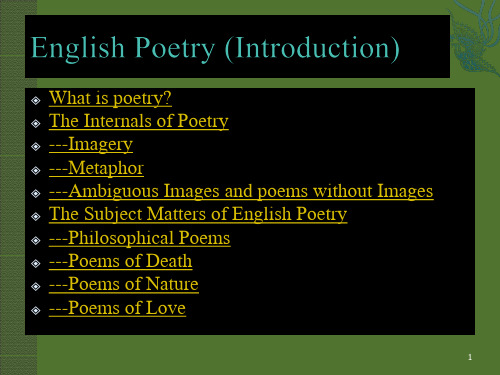
b. To induce the reader a kind of attitude to something or coalition with something else. Because I could not stop for Death— He kindly stopped for me— The Carriage held but just Ourselves— And Immortality.
2
1. The genealogical level
2. The typographical level
3
《亲爱的傻瓜》
天下武功第一的欧阳锋
竟然被郭靖用计活捉
他百思不得其解 对郭靖说了这样两句话: “你知道我平生最恨什么吗? 我最恨落在傻瓜手里”
4
《一个人来到田纳西》
毫无疑问
“是一种用美的文字……音律的绘画的文字…… 表 写人的情绪中的意境。” -宗白华,《美学散步》 “画者,天地无声之诗;诗者,天地无色之画。” -叶燮 “Painting is silent poetry, and poetry is a speaking picture.”----Simonides (556 BC - 468 BC) (画是无声的诗,诗是有声的画。) Painting (spatial art) presents points in space while poetry, as temporal art ,presents points in succession. 黑格尔认为,作为语言艺术的诗歌是第三种艺术。 绘画提供明确的外在形象(form),但在表现内心生 活方面还有欠缺,于是才有了音乐(melody);音乐在 表现内心生活的特殊具体方面欠明确,于是才有了 诗歌(language)。 8
igcse英语文学poetry鉴赏

igcse英语文学poetry鉴赏Poetry is a powerful form of literary expression that allows poets to convey deep emotions and complex ideas through the use of language. It is a way for individuals to explore themes such as love, nature, and life itself, in a creative and evocative manner. In the realm of IGCSE English literature, the study and appreciation of poetry play a significant role in developing students' critical thinking skills and their ability to interpret and analyze texts.诗歌是一种强大的文学表达形式,使诗人能够通过语言的运用传达深层情感和复杂思想。
它是一种个体探索爱情、自然和生活本身等主题的方式,以创造性和引人入胜的方式。
在IGCSE英语文学领域,对诗歌的研究和欣赏在培养学生批判性思维能力及其解释和分析文本的能力中起着重要作用。
One of the key aspects of studying poetry is to understand the various elements that make up a poem, such as rhyme, meter, and imagery. These elements contribute to the overall structure and meaning of a poem, and understanding how they work together can enhance one's appreciation for the art form. Through close readingand analysis, students can delve into the nuances of a poem and uncover the deeper layers of meaning hidden within the text.学习诗歌的关键之一是要了解组成诗歌的各种元素,如押韵、格律和意象。
英语诗歌鉴赏总结范文
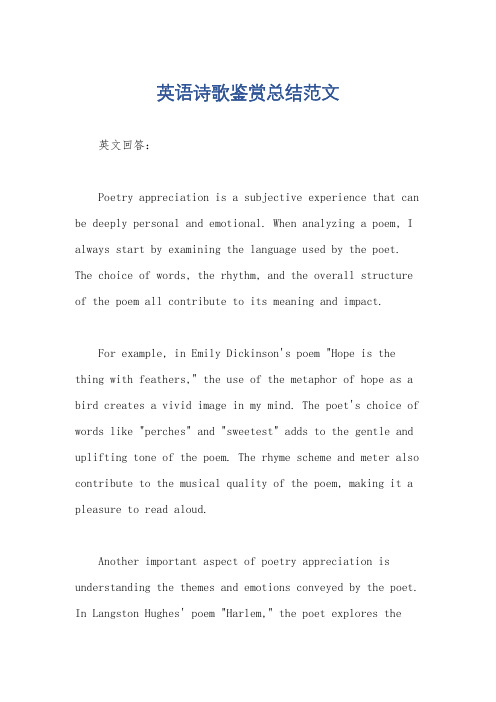
英语诗歌鉴赏总结范文英文回答:Poetry appreciation is a subjective experience that can be deeply personal and emotional. When analyzing a poem, I always start by examining the language used by the poet. The choice of words, the rhythm, and the overall structure of the poem all contribute to its meaning and impact.For example, in Emily Dickinson's poem "Hope is the thing with feathers," the use of the metaphor of hope as a bird creates a vivid image in my mind. The poet's choice of words like "perches" and "sweetest" adds to the gentle and uplifting tone of the poem. The rhyme scheme and meter also contribute to the musical quality of the poem, making it a pleasure to read aloud.Another important aspect of poetry appreciation is understanding the themes and emotions conveyed by the poet. In Langston Hughes' poem "Harlem," the poet explores theidea of deferred dreams and the consequences of delayingone's aspirations. The repeated question "What happens to a dream deferred?" creates a sense of urgency and frustration, highlighting the impact of unfulfilled ambitions.In addition to analyzing the language and themes of a poem, I also pay attention to the historical and cultural context in which it was written. For example, when reading William Wordsworth's "I Wandered Lonely as a Cloud," I consider the Romantic ideals of nature and the poet's own experiences in the Lake District. Understanding the context helps me appreciate the deeper layers of meaning in the poem.Overall, poetry appreciation is a rich and rewarding experience that allows me to connect with the emotions and perspectives of different poets. Each poem is like a window into the soul of the poet, offering insights andreflections on the human experience.中文回答:诗歌鉴赏是一种主观的体验,可以是非常个人化和情感化的。
诗歌短评英语作文
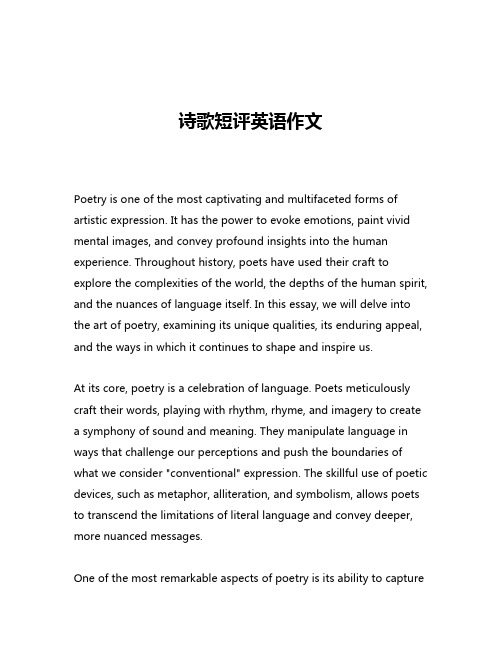
诗歌短评英语作文Poetry is one of the most captivating and multifaceted forms of artistic expression. It has the power to evoke emotions, paint vivid mental images, and convey profound insights into the human experience. Throughout history, poets have used their craft to explore the complexities of the world, the depths of the human spirit, and the nuances of language itself. In this essay, we will delve into the art of poetry, examining its unique qualities, its enduring appeal, and the ways in which it continues to shape and inspire us.At its core, poetry is a celebration of language. Poets meticulously craft their words, playing with rhythm, rhyme, and imagery to create a symphony of sound and meaning. They manipulate language in ways that challenge our perceptions and push the boundaries of what we consider "conventional" expression. The skillful use of poetic devices, such as metaphor, alliteration, and symbolism, allows poets to transcend the limitations of literal language and convey deeper, more nuanced messages.One of the most remarkable aspects of poetry is its ability to capturethe essence of the human experience. Poets delve into the realms of emotion, exploring the full spectrum of human feelings – from the ecstasy of love to the anguish of loss, from the wonder of nature to the complexities of the human psyche. Through their words, they give voice to the universal experiences that unite us all, allowing readers to connect with the poet's perspective and find resonance in their own lives.Moreover, poetry has the power to transport us to different worlds and perspectives. By stepping into the shoes of the poet, we are able to glimpse the unique worldviews and lived experiences of others. This can foster empathy, broaden our understanding, and challenge our preconceptions. Poetry has the remarkable ability to transcend cultural and linguistic barriers, allowing us to connect with the shared humanity that lies at the heart of the human experience.Another remarkable quality of poetry is its adaptability. Throughout the ages, poets have embraced a wide variety of forms and styles, from the structured elegance of sonnets to the free-flowing expressiveness of free verse. This diversity allows poetry to evolve and adapt to the changing needs and sensibilities of different eras and cultures. As society and technology have advanced, so too has the art of poetry, with poets incorporating new modes of expression and experimenting with innovative techniques.One of the most enduring appeals of poetry is its ability to capture the essence of a moment or a feeling in a concise and powerful way. Through the careful selection and arrangement of words, poets are able to distill complex emotions and experiences into a few carefully crafted lines. This concision allows poetry to resonate deeply with readers, who can return to a poem again and again, discovering new layers of meaning and personal significance.Furthermore, poetry has the power to inspire and transform. By challenging us to see the world in new ways, poetry can spark our imagination, stimulate our intellect, and even catalyze social change. Throughout history, poets have used their craft to give voice to the marginalized, to challenge oppressive systems, and to advocate for justice and equality. In this way, poetry becomes a powerful tool for social and political expression, serving as a medium for the voiceless and a catalyst for progress.In conclusion, poetry is a remarkable art form that continues to captivate and inspire us. Through its unique use of language, its ability to capture the human experience, and its adaptability to changing times, poetry has the power to touch our hearts, expand our minds, and connect us to the shared experiences that unite us all. As we continue to explore and engage with the rich tapestry of poetic expression, we can discover new ways of understanding ourselves, our world, and our place within it.。
英语诗歌入门1.
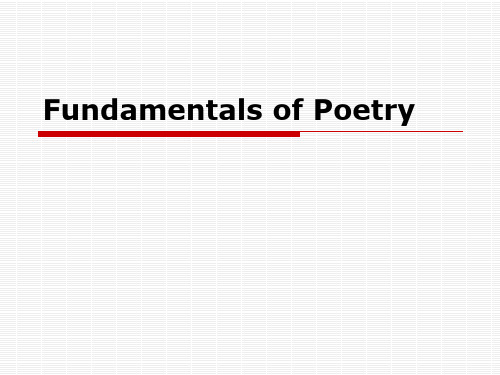
Ballads(民谣) (民谣)
Ballads are perhaps the most popular form of narrative poetry. Originally ballads were meant to be sung or recited. Folk ballads (popular ballads as they are sometimes called) were passed on orally, only to be written down much later.
Epic(史诗) (史诗)
The grandest of narratives is the epic. Epics are long narrative poems that record the adventures of a hero whose exploits are important to the history of a nation. Typically they chronicle the origins of a civilization and embody its central beliefs and values. Epics tend to be larger than life as they recount valorous deeds enacted in vast landscapes. The epic style is as grand as the action; the conventions require that the epic be formal, complex, and serious — suitable to its important subjects.
英语诗歌带翻译简单

英语诗歌带翻译简单Poetry is a form of art that uses language to convey emotions, thoughts, and ideas. It has been an integral part of human culture for centuries, with poets from all over the world using it to express their deepest feelings and experiences. In this article, we will explore the beauty of English poetry and provide translations for some of the most famous pieces.One of the most well-known English poets is William Shakespeare. His sonnets are some of the most beloved works of poetry in the English language. Here is one of his most famous sonnets, along with a translation:Sonnet 18:Shall I compare thee to a summer's day?Thou art more lovely and more temperate:Rough winds do shake the darling buds of May,。
And summer's lease hath all too short a date:Sometime too hot the eye of heaven shines,。
赏析英文诗Poetry诗意
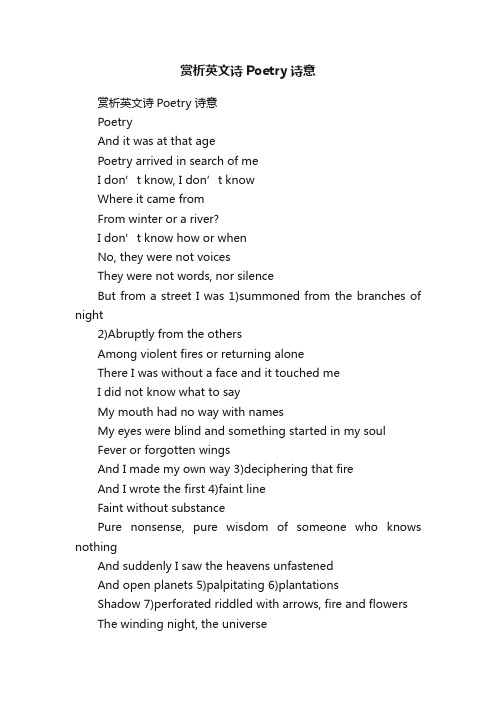
赏析英文诗Poetry诗意赏析英文诗Poetry 诗意PoetryAnd it was at that agePoetry arrived in search of meI don’t know, I don’t knowWhere it came fromFrom winter or a river?I don’t know how or whenNo, they were not voicesThey were not words, nor silenceBut from a street I was 1)summoned from the branches of night2)Abruptly from the othersAmong violent fires or returning aloneThere I was without a face and it touched meI did not know what to sayMy mouth had no way with namesMy eyes were blind and something started in my soulFever or forgotten wingsAnd I made my own way 3)deciphering that fireAnd I wrote the first 4)faint lineFaint without substancePure nonsense, pure wisdom of someone who knows nothingAnd suddenly I saw the heavens unfastenedAnd open planets 5)palpitating 6)plantationsShadow 7)perforated riddled with arrows, fire and flowersThe winding night, the universeAnd I 8)infinitesimal being drunk with the great 9)starry 10)voidLightness image of mystery felt myself a pure part of the11)abyssI wheeled with the starsMy heart 12)broke loose on the wind就在那时诗意觅我而来我不清楚,我不明白它从何方寻来或是寒冬?或是河流?我不知道它是如何,又是何时到来不,那不是声音不是文字,更非寂静那是街头长夜不时的召唤蓦地它来了在狂野眩目的星火中,在寂寞归家的路上我好似迷茫而恍惚,迷离中被它攫住无以名状难以言述视线模糊,灵魂开始了异动灼热与被遗忘的羽翼我试图诠释那一团火簇于是我写下第一行苍白的诗句苍白得飘渺这只是胡言乱语,无知者的思想突然间我看见天堂打开了门锁星儿迸出,在林宇间舞动姿影婆娑,如箭, 如火,如花起风的.夜晚,苍穹浩渺渺小的我沉醉在这星光璀璨的长空轻盈神秘的影像中,我如沧海一粟随着星儿一道旋转飘忽心儿与风自由放逐1、 summon v. 召集,召唤2、 abruptly ad. 突然地3、 decipher v. 解开(疑团),破译(密码)4、 faint a. 微弱的5、 palpitate v. 跳动;颤抖6、 plantation n. 种植园,大森林7、 perforate v. 穿孔8、 infinitesimal a. 无穷小的,极小的9、 starry a. 布满星星的10、 void n. 空间11、 abyss n. 深渊12、 break loose 挣脱束缚或限制。
英语诗歌讲解方法
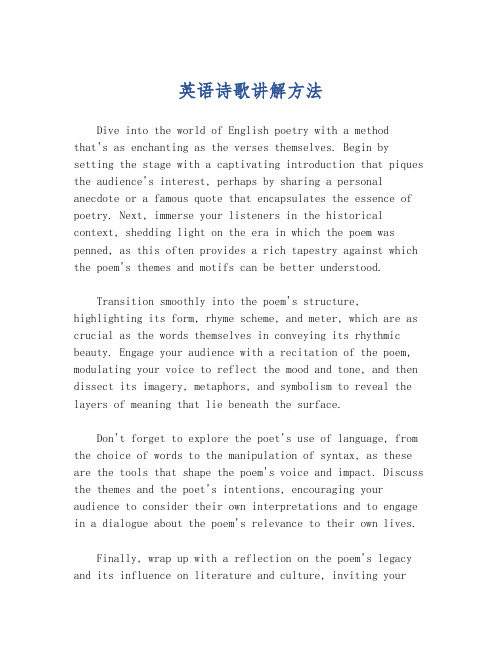
英语诗歌讲解方法Dive into the world of English poetry with a methodthat's as enchanting as the verses themselves. Begin by setting the stage with a captivating introduction that piques the audience's interest, perhaps by sharing a personal anecdote or a famous quote that encapsulates the essence of poetry. Next, immerse your listeners in the historical context, shedding light on the era in which the poem was penned, as this often provides a rich tapestry against which the poem's themes and motifs can be better understood.Transition smoothly into the poem's structure, highlighting its form, rhyme scheme, and meter, which are as crucial as the words themselves in conveying its rhythmic beauty. Engage your audience with a recitation of the poem, modulating your voice to reflect the mood and tone, and then dissect its imagery, metaphors, and symbolism to reveal the layers of meaning that lie beneath the surface.Don't forget to explore the poet's use of language, from the choice of words to the manipulation of syntax, as these are the tools that shape the poem's voice and impact. Discuss the themes and the poet's intentions, encouraging your audience to consider their own interpretations and to engage in a dialogue about the poem's relevance to their own lives.Finally, wrap up with a reflection on the poem's legacy and its influence on literature and culture, inviting youraudience to explore more of the poet's work and to discover the joy of reading and analyzing poetry for themselves. Remember, the goal is not just to teach but to inspire a lifelong appreciation for the art of poetry.。
短一点的英语诗歌
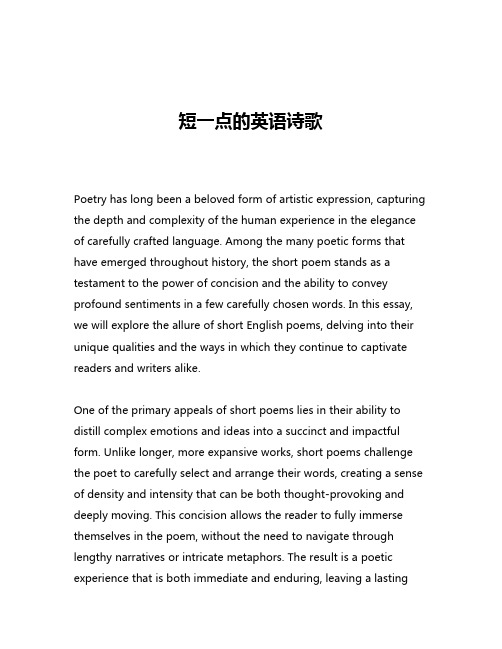
短一点的英语诗歌Poetry has long been a beloved form of artistic expression, capturing the depth and complexity of the human experience in the elegance of carefully crafted language. Among the many poetic forms that have emerged throughout history, the short poem stands as a testament to the power of concision and the ability to convey profound sentiments in a few carefully chosen words. In this essay, we will explore the allure of short English poems, delving into their unique qualities and the ways in which they continue to captivate readers and writers alike.One of the primary appeals of short poems lies in their ability to distill complex emotions and ideas into a succinct and impactful form. Unlike longer, more expansive works, short poems challenge the poet to carefully select and arrange their words, creating a sense of density and intensity that can be both thought-provoking and deeply moving. This concision allows the reader to fully immerse themselves in the poem, without the need to navigate through lengthy narratives or intricate metaphors. The result is a poetic experience that is both immediate and enduring, leaving a lastingimpression on the reader's mind and heart.Moreover, the brevity of short poems often lends itself to a heightened sense of musicality and rhythm. The careful placement of words, the strategic use of rhyme and meter, and the attention to the aural qualities of language all contribute to the creation of a poetic experience that is both intellectually engaging and aesthetically pleasing. This musical quality can be particularly powerful in short poems, as the rhythm and cadence of the language become more pronounced and integral to the overall effect of the work.Another key aspect of short poems is their ability to capture a fleeting moment or a single, powerful emotion. In contrast to longer works that may explore the nuances and complexities of human experience, short poems often focus on a specific, distilled moment or feeling, allowing the reader to fully immerse themselves in that singular, concentrated experience. This focus on the particular can be deeply resonant, as it allows the reader to recognize and relate to the universal human truths that underlie the specific details of the poem.Furthermore, the concision of short poems can also lend itself to a sense of mystery and ambiguity, inviting the reader to engage in a process of interpretation and contemplation. The sparse nature of the language can leave room for multiple interpretations and layersof meaning, encouraging the reader to actively participate in the creation of the poem's significance. This collaborative relationship between the poet and the reader can be deeply rewarding, as it allows the reader to bring their own experiences and perspectives to the work, ultimately enriching the poetic experience.It is important to note that the term "short poem" is not a rigid or prescriptive category, but rather a flexible and fluid concept that can encompass a wide range of poetic forms and styles. From the haiku, with its strict adherence to a 5-7-5 syllabic structure, to the free-verse lyric that relies on the power of language and imagery, short poems can take on a multitude of shapes and forms. This diversity is a testament to the versatility and adaptability of the short poem, as poets continue to push the boundaries of the form and explore new ways of expressing the human experience.One of the most celebrated examples of the short poem in English literature is the work of the American poet, Emily Dickinson. Dickinson's poems, often just a few lines in length, are renowned for their profound insights, their striking imagery, and their ability to capture the complexities of the human condition in a few carefully chosen words. In her poem "I Heard a Fly Buzz When I Died," Dickinson masterfully weaves together the mundane and the transcendent, creating a poetic experience that is both unsettling and deeply moving.Another renowned practitioner of the short poem is the British poet, Christina Rossetti. Rossetti's poems, such as "Remember" and "When I Am Dead, My Dearest," explore themes of love, loss, and the human experience with a poignant simplicity that belies their emotional depth. The concision of her language, coupled with the power of her imagery, has made Rossetti's work a beloved staple of the English poetic canon.In more contemporary times, the short poem has continued to captivate both writers and readers. Poets such as Mary Oliver, Sylvia Plath, and Seamus Heaney have all made significant contributions to the tradition of the short poem, each bringing their own unique voices and perspectives to the form. Oliver's nature-inspired poems, with their keen observations and lyrical grace, have become beloved for their ability to connect the reader to the natural world. Plath's intense and deeply personal poems, meanwhile, have earned her a place as one of the most influential poets of the 20th century. And Heaney's poems, with their rich, evocative language and their exploration of identity and place, have earned him widespread acclaim and recognition.In conclusion, the short poem stands as a testament to the power of language and the depth of human experience. Through their concision and their ability to capture fleeting moments and profoundemotions, short poems have the capacity to captivate, inspire, and challenge readers in ways that longer, more expansive works cannot. As poets continue to explore and expand the boundaries of the short poem, it is clear that this poetic form will continue to hold a cherished place in the literary landscape, offering readers and writers alike a unique and rewarding means of engaging with the complexities of the human condition.。
英语诗歌的类型TypesofPoetry
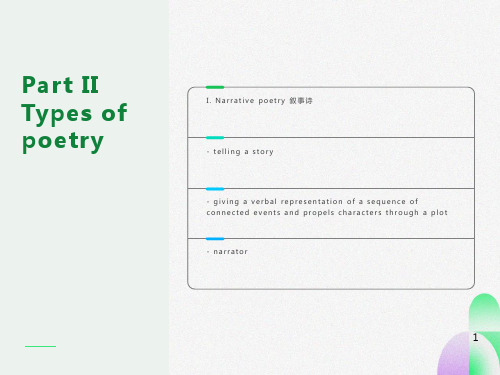
4
- describing the simplicity, charm and serenity attributed to country
5
- placing kindly, rural people in nature-centered activities
6
- William Wordsworth: Michael: A Pastoral Poem
with no set metrical form, generally of melancholy tone, often on death - Thomas Gray: Elegy Written in a Country Churchyard
9
五.Dirge 挽歌 - originally a religious service in honor of the dead - now any song of mourning, shorter and less formal than
Descriptive poetry - devoted to the portray of external objects or scenes - giving expression to the poet’s thoughts and feelings aroused by the various scenes and objects in the natural world - often didactic - William Wordsworth: Composed Upon Westminster Bridge
18
3
三.Romance 传奇 - primarily medieval fiction in verse or prose dealing with
英文诗歌Poetry(含中文翻译)
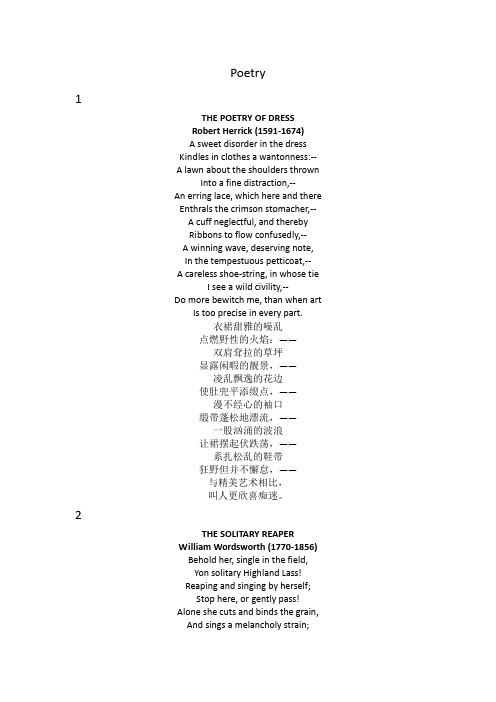
Poetry1THE POETRY OF DRESSRobert Herrick (1591-1674)A sweet disorder in the dressKindles in clothes a wantonness:--A lawn about the shoulders thrownInto a fine distraction,--An erring lace, which here and thereEnthrals the crimson stomacher,--A cuff neglectful, and therebyRibbons to flow confusedly,--A winning wave, deserving note,In the tempestuous petticoat,--A careless shoe-string, in whose tieI see a wild civility,--Do more bewitch me, than when artIs too precise in every part.衣裙甜雅的噪乱点燃野性的火焰:——双肩耷拉的草坪显露闲暇的靓景,——凌乱飘逸的花边使肚兜平添缀点,——漫不经心的袖口缎带蓬松地漂流,——一股汹涌的波浪让裙摆起伏跌荡,——系扎松乱的鞋带狂野但并不懈怠,——与精美艺术相比,叫人更欣喜痴迷。
2THE SOLIT ARY REAPERWilliam Wordsworth (1770-1856)Behold her, single in the field,Yon solitary Highland Lass!Reaping and singing by herself;Stop here, or gently pass!Alone she cuts and binds the grain,And sings a melancholy strain;O listen! for the Vale profoundIs overflowing with the sound.No Nightingale did ever chauntMore welcome notes to weary bandsOf travellers in some shady haunt,Among Arabian sands:A voice so thrilling ne'er was heardIn spring-time from the Cuckoo-bird,Breaking the silence of the seasAmong the farthest Hebrides.Will no one tell me what she sings?--Perhaps the plaintive numbers flowFor old, unhappy, far-off things,And battles long ago:Or is it some more humble lay,Familiar matter of to-day?Some natural sorrow, loss, or pain,That has been, and may be again?Whate'er the theme, the Maiden sangAs if her song could have no ending;I saw her singing at her work,And o'er the sickle bending;——I listen'd, motionless and still;And, as I mounted up the hill,The music in my heart I bore,Long after it was heard no more3How Do I Love Thee?Elizabeth Barrett Browning (1806–1861)How do I love thee? Let me count the ways.I love thee to the depth and breadth and heightMy soul can reach, when feeling out of sightFor the ends of Being and ideal Grace.I love thee to the level of everyday'sMost quiet need, by sun and candle-light.I love thee freely, as men strive for Right;I love thee purely, as they turn from Praise.I love thee with the passion put to useIn my old griefs, and with my childhood's faith.I love thee with a love I seemed to loseWith my lost saints, -- I love thee with the breath,Smiles, tears, of all my life! -- and, if God choose,I shall but love thee better after death.我是怎样地爱你?让我逐一细算。
英语诗歌讲解poetry
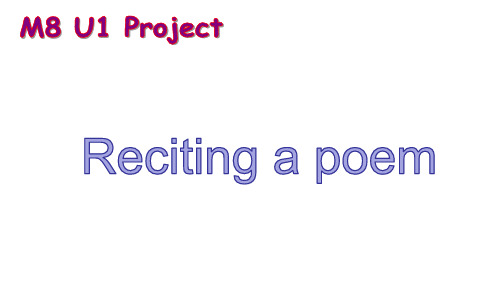
But if you’ve a need for love
I’ll give you all I _____ own It might help you down the road Till you’ve found your own _____.
I want to give you all my love
Birth Place: Alloway Scotland
Can you understand and read the poem “A Red, Red Rose”?
Old Scottish English luve melodie art thou thee gang Till a’ the seas wi’ the sun the sands o’ life Tho’ it were
In my life , my mother Mrs. Moore is the one who influences me most. She is forty-four, and she is very active. She always encourages me to have a try whenever I have difficulty in understanding something. She pays more attention to the building of my self-confidence. In this way she leads me to a world of “why”. She is such a knowledgeable person that I love and admire her more and more .
批注本地保存成功开通会员云端永久保存去开通
欣赏诗歌英语作文
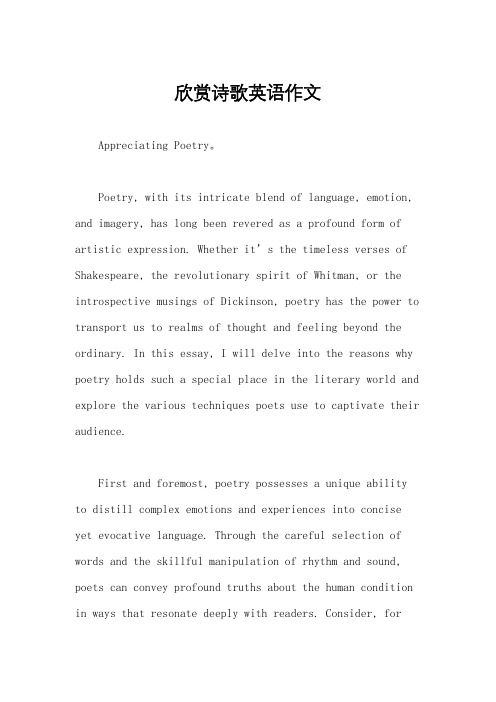
欣赏诗歌英语作文Appreciating Poetry。
Poetry, with its intricate blend of language, emotion, and imagery, has long been revered as a profound form of artistic expression. Whether it’s the timeless verses of Shakespeare, the revolutionary spirit of Whitman, or the introspective musings of Dickinson, poetry has the power to transport us to realms of thought and feeling beyond the ordinary. In this essay, I will delve into the reasons why poetry holds such a special place in the literary world and explore the various techniques poets use to captivate their audience.First and foremost, poetry possesses a unique ability to distill complex emotions and experiences into concise yet evocative language. Through the careful selection of words and the skillful manipulation of rhythm and sound, poets can convey profound truths about the human condition in ways that resonate deeply with readers. Consider, forexample, the haunting beauty of T.S. Eliot's "The Waste Land," which explores themes of disillusionment and despair in the aftermath of World War I. Through its fragmented imagery and shifting perspectives, the poem captures the sense of fragmentation and alienation that pervaded the post-war era, leaving a lasting impression on readers.Furthermore, poetry often serves as a mirror reflecting the cultural and historical context in which it is written. From the Romantic poets' celebration of nature to the Beat Generation's critique of consumerism and conformity, poetry has been a vehicle for social commentary and cultural critique throughout history. By examining the themes and motifs present in a particular poem, readers can gain insight into the values, beliefs, and concerns of the society that produced it. For instance, Langston Hughes' "Harlem" explores the deferred dreams of African Americans in the face of racial injustice, giving voice to the frustrations and aspirations of a marginalized community.In addition to its thematic richness, poetry also dazzles with its formal experimentation and aestheticinnovation. From traditional forms like the sonnet and villanelle to more avant-garde techniques like free verse and concrete poetry, poets have continually pushed the boundaries of language and form in their quest for artistic expression. Consider, for example, the groundbreaking work of e.e. cummings, whose playful manipulation of syntax and punctuation challenged conventional notions of grammar and syntax, inviting readers to see the world anew through fresh eyes.Moreover, poetry has the power to forge connections across time and space, bridging the gap between individuals separated by geography, culture, and even centuries. Through the act of reading and interpreting poetry, readers are able to enter into a dialogue with the poet, engagingin a shared exploration of the human experience. Whetherit's the ancient verses of Sappho or the contemporarylyrics of Rupi Kaur, poetry has the ability to transcend barriers of language and culture, forging bonds of empathy and understanding between people from diverse backgrounds.In conclusion, poetry occupies a unique and cherishedplace in the literary landscape, offering readers a window into the depths of the human soul. Through its powerful language, rich symbolism, and timeless themes, poetry has the power to inspire, challenge, and uplift us, enriching our lives in ways both profound and enduring. So let us continue to celebrate and cherish the art of poetry, recognizing its ability to illuminate the beauty and complexity of the world we inhabit.。
- 1、下载文档前请自行甄别文档内容的完整性,平台不提供额外的编辑、内容补充、找答案等附加服务。
- 2、"仅部分预览"的文档,不可在线预览部分如存在完整性等问题,可反馈申请退款(可完整预览的文档不适用该条件!)。
- 3、如文档侵犯您的权益,请联系客服反馈,我们会尽快为您处理(人工客服工作时间:9:00-18:30)。
But if you’ve a need for love
I’ll give you all I _____ own It might help you down the road Till you’ve found your own _____.
I want to give you all my love
In my life , my mother Mrs. Moore is the one who influences me most. She is forty-four, and she is very active. She always encourages me to have a try whenever I have difficulty in understanding something. She pays more attention to the building of my self-confidence. In this way she leads me to a world of “why”. She is such a knowledgeable person that I love and admire her more and more .
But if you’ve a need for love
I’ll give you all I _____ It might help you down the road Till you’ve found your own _____.
I’ve saved the summer And I give it all to____ To hold on winter mornings When the snow is _____. I’ve saved some sunlight If you should ever _____ A place away from darkness Where your mind can _____.
Modern English love melody are you you go Till all the seas with the sun the sands of life Though it were
fare thee weel
fare you well
A Red Red Rose
By Robert Burns
Do re Байду номын сангаасi
Doe a deer a female deer Ray a drop of golden sun Me a name I call myself Far a long long way to run Sew a needle pulling thread La a note to follow Sew Tea a drink with jam and bread That will bring us back to Doe oh - oh - oh That will bring us back to Doe Do –Re –Mi –Fa –So –La –Ti Do-So-Do
My Mother Mrs. Moore Here's my mother Mrs. Moore, Who is active and forty-four ________________________. Always encouraging me to try ________________________, She leads me to a world of “why” _________________________. _________________________. I admire her more and more
And fare you well, my only love,
And fare you well a while!
And I will come again, my love,
Though it were ten thousand mile.
Like many of Burns’s poems, this one was also intended to be a song. Let’s enjoy the song!
writing
Read the short passage ,and write a poem with the title “My Mother Mrs. Moore” according to the information .
My Mother Mrs. Moore Here's my mother Mrs. Moore, ________________________. ________________________, ________________________. ________________________.
• Read the poems and try to recite them. • Translate the poem I've saved the summer. • Try to understand and appreciate Sonnet 18.
Let’s enjoy an English poem in the form of a song: Do-Re-Me and try to find out the rhymes and the rhythm.
• Poetry tends to express the universal. --- Aristotle
• Poetry is the record of the best and happiest moments of the best minds. --- Percy Bysshe Shelley • A poem begins in delight and ends in wisdom. --- Robert Frost
Listening
I’ve saved the summer And I give it all to____ To hold on winter mornings When the snow is _____. I’ve saved some sunlight If you should ever _____ A place away from darkness Where your mind can _____. And for myself I’ve kept your smile When you were but ________, Till you’re older you’ll not know What brave young smiles can ______. I know no answers To help you on your ______ The answers lie somewhere At the bottom of the _____.
O my love’s like a red red rose That’s newly sprung in June :
Till all the seas go dry, my dear, And the rocks melt with the sun; I will love you still, my dear, While the sands of life shall run.
Rod Mckuen (April 29, 1933 – January 29, 2015)
He was an American singer-songwriter, musician and poet. He was one of the bestselling poets in the United States during the late 1960s.
And for myself I’ve kept your smile When you were but ________, Till you’re older you’ll not know What brave young smiles can ______. I know no answers To help you on your ______ The answers lie somewhere At the bottom of the _____.
O my love’s like the melody That’s sweetly play’d in tune!
As fair are you, my bonnie lass,
So deep in love am I:
And I will love you still, my dear, Till all the seas go dry:
Birth Place: Alloway Scotland
Can you understand and read the poem “A Red, Red Rose”?
Old Scottish English luve melodie art thou thee gang Till a’ the seas wi’ the sun the sands o’ life Tho’ it were
